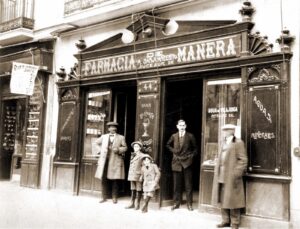Titulación y reconocimiento profesional de los auxiliares de farmacia en España con anterioridad a la Guerra Civil (1904-1936)
Llull, 2022, vol. 45, nº 91
Qualification and professional recognition of pharmacy assistants in Spain before the Civil War (1904-1936)
Raúl Rodríguez Nozal

Cómo citar
Rodríguez Nozal, Raúl (2022). «Titulación y reconocimiento profesional de los auxiliares de farmacia en España con anterioridad a la Guerra Civil (1904-1936)». Llull, 45(91), 159-182.<https://doi.org/10.47101/llull.2022.45.91.rodriguez>
¡Comparte en tus redes!
Resumen
En este trabajo exponemos las reivindicaciones y los proyectos de los auxiliares de farmacia españoles en favor de un título que les capacitara profesionalmente, al igual que sucedía con otras profesiones regladas equivalentes (matronas, sangradores, ministrantes, practicantes y enfermeras). Analizamos las posibles razones que guiaron a las autoridades a denegar sistemáticamente esta titulación, el importante papel desempeñado por los farmacéuticos en estas decisiones y el debate, entre defensores y detractores del título, mantenido en el seno de este colectivo profesional y, sobre todo, en el de los auxiliares de farmacia.
Tras abordar algunos antecedentes en torno al reconocimiento legal de los auxiliares de farmacia en España durante el siglo XIX, nos hacemos eco de los primeros intentos por establecer esta titulación gracias a la vía abierta por la Instrucción de Sanidad de 1904, de la insistente lucha societaria emprendida por los auxiliares de farmacia para defender sus derechos durante el primer tercio del siglo XX, y finalizamos con una breve victoria parcial de este colectivo: el título de ‘Practicant de Farmàcia’ de 1934, de aplicación únicamente en Cataluña y con una vida muy breve, pues la Guerra Civil acabó con las aspiraciones de los auxiliares, que tendrían que volver a la lucha durante el franquismo, ya sin la fuerza asociativa que representaba la Federación Nacional de Auxiliares de Farmacia.
Abstract
In this study we discuss the demands and projects of the Spanish pharmacy assistants for a qualification that would qualify them professionally, as was the case with other equivalent regulated professions (midwives, bleeders, ministrants, practitioners, and nurses). We analyse the possible reasons that led the authorities to systematically deny this qualification, the important role played by pharmacists in these decisions and the debate, between supporters and opponents of the qualification, within this professional group and, above all, among pharmacy assistants.
After some background information on the legal recognition of pharmacy assistants in Spain during the 19th century, we look at the first attempts to establish this qualification thanks to the path opened up by the Health Instruction of 1904, the insistent social struggle undertaken by pharmacy assistants to defend their rights during the first third of the 20th century, and we end with a brief partial victory for this group: The 1934 title of ‘Practicant de Farmàcia’, applicable only in Catalonia and with a very short life, as the Civil War put an end to the aspirations of the auxiliaries, who would have to return to the struggle during Franco’s regime, now without the associative strength represented by the National Federation of Pharmacy Assistants.
Palabras clave
Farmacia, auxiliares, titulación profesional, siglo XX.
Keywords
Pharmacy, assistants, professional qualifications, 20th century.

